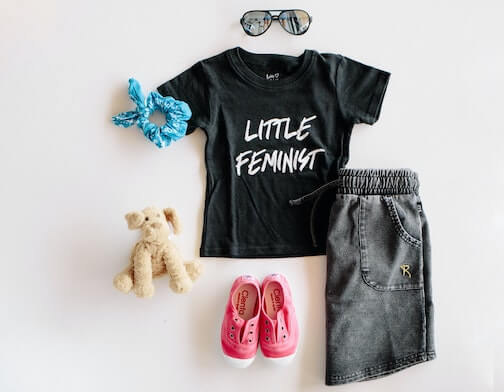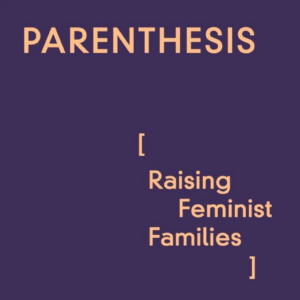I have always been a feminist and recently I became a parent, which got me wondering if I was a feminist parent. Feminist parenthood looks at parenting through a feminist and gender lens, rather than adding gender equitable practices to other parenting philosophies. At its best, it’s an actionable, skill-based approach of parenting through feminism. With that “actionable” part in mind, here is a short list of practical ways of making sure we are raising feminist children, equipped to deal with gender, equity and equality in this scary, fast-changing world.
1. START TALKING ABOUT GENDER EARLY
When should we start talking to kids about gender, equality and patriarchy? Turns out, the answer to the question is much earlier than you would have thought. Children start internalizing gender roles and norms by the age 3 and girls start forming self-limiting beliefs by the age 5, starting to believe things like “boys are better at math than girls” or “girls cannot play football”. That’s scary early but the good news is that talking to babies and toddlers about these issues doesn’t have to be intimidating. It’s as easy as changing the genders of characters in the stories you’re reading (make the princess save the prince in distress every now and then) and referring to people in a genderless manner. If we keep emphasizing the gender of a person, for instance saying, “Look at that lady with the baby” or “That man is so strong’, children start believing that gender is a super important category and start extrapolating their own conclusions out of it- all women have babies, all men are strong. These simple ways of removing gender norms out of the equation help kids navigate the world with fewer constrictions they put on themselves and on others around them.
2. MODEL EQUALITY AT HOME
While we are getting better at achieving equality in the public arena, we are a long way from achieving any kind of equality at home. India and the rest of South Asia has the second-worst ratio in the world of the amount of unpaid labor performed at home by men and women. There can be no equality for our daughters and sons if they end up in relationships in which they do a disproportionate amount of emotional and domestic labor without ever learning what an equal partnership looks like. The first step in combating that is modeling the kind of relationships you want your kids to have at home. Is the division of labor at home gendered? Is the mom doing all the “feminine” jobs like cooking and cleaning while the dad is in charge of small handy work around the house? Who oversees taking care of family health, gifts and holiday season entertaining? What does that split look like in terms of time commitment by both parents? The Fair Play cards are a great starting point to have an open and honest conversation with your partner around these issues. Unequal home doesn’t just set up our daughters for failure, they also set up boys with unrealistic expectations of what life will look like for them, which is a recipe for disappointment and unhappy relationships later in life.
3. RECOGNIZE YOUR OWN BIAS
No-one is a perfect parent, a perfect feminist or a perfect feminist parent. Recognizing the fact that this is a life-long commitment to more equitable parenting practices and not a one-off deal will help you set yourself up for success. Now the hard truth is that we all have bias. It is how we navigate life, how we form our social groups and how we make quick decisions about the people around us, for better or for worse. The problem arises when we stop questioning our biases and take them at face value. When my baby was six weeks old and crying, I told him “You’re a big boy, don’t cry”. I teach about gender for a living and I still internalized so much nonsense around gender, it hurts me to think what it’s like for others. Recognizing our own blind spots and our own preconceived notions of gender and what is “appropriate” is the crucial first step to becoming better at feminist parenting.
4. INVOLVE THE WHOLE FAMILY
Often, I hear from moms something along the lines of ‘Well, I understand the importance of gender equality, but my parents and in-laws are of a different generation and they are very set in their own ways”. This is particularly a problem in India where joint families are common and the issue of intergenerational respect is massive. My answer- not every hill is worth dying on. Choose your battles carefully and make sure you stand up for what is important to you and your family. You really don’t want to pierce the baby’s ears because bodily autonomy is important to you? Have an honest conversation about it backed up by articles and readings when the emotions are running low. Acknowledge the importance of tradition and suggest an alternative that is more aligned with your values but makes the family feel heard and involved. I sent my parents this 28-page guide, and while I acknowledge not all families might be open to reading massive feminist texts, it helped us communicate our values without the emotional charge that usually follows these conversations when someone is feeling under attack.
5. BOYS HAVE A GENDER TOO
Whenever I tell people I work in gender, people automatically hear “women empowerment”, as if only women and girls have a gender. Masculinity has been seen as the norm since ancient Greece and femininity as the deviation from that norm, which is why we still see gender work as not inclusive of men and boys. However, true quality starts with being more proactive with ways we engage men and boys in conversations around gender and patriarchy. It is crucial to acknowledge patriarchy hurts men and boys as well. In fact, the masculinity crisis in so large that the American Psychological Association issued special guidelines for working with men and boys suffering from the fallout of toxic masculinity. In India, the whole “raja beta” mentality is leaving generations of men unable to deal with their place in the world and their own mental health. Healthy societies need healthy boys and men. Practically, this means creating more safe spaces for men to discuss their own gender struggles and struggles with expectations societies put on the, allowing boys to be as emotionally expressive as they want and having more men willing to call out other men on their sexist behavior.
To help parents navigate the world of gender and feminism, join one of Parenthesis parenting circles and follow for more resources, reviews and practical tips, as well as a community of like-minded parents and caregivers!
Main photo from Jordan Nixx




